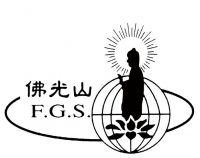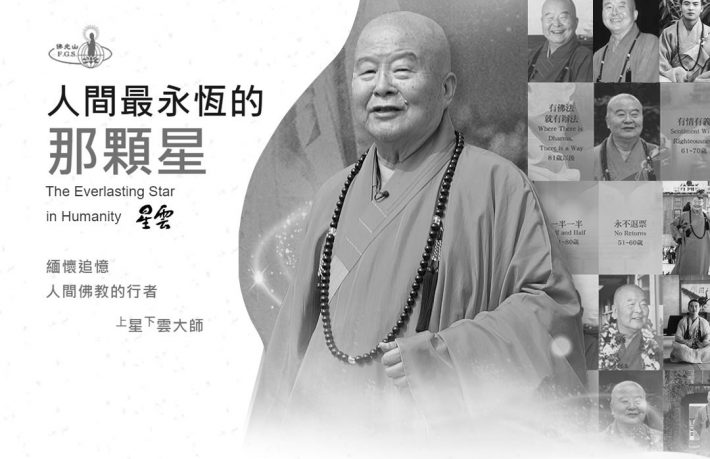人間最永恆的那顆星 星雲大師 Ven. Master Hsing Yun, The Everlasting Star in Humanity
一顆永恆的星- 我們全世界的佛光人一起緬懷星雲大師
20230206 人間佛教的領航者專題第一集: 一代高僧星雲大師
20230207 人間佛教的領航者專題第二集:文字般若著書立說
20230208 人間佛教的領航者專題第三集:人間佛教實踐者
20230209 人間佛教的領航者專題第四集:百年佛緣乘願再來
20230210人間佛教的領航者專題第五集:一筆字的大願心
20230211人間佛教的領航者專題第六集:兩岸傳燈不忘初心
20230212 人間佛教的領航者專題第七集:創意大師擘劃佛教新局
星雲大師【百年佛緣】– 人間佛教,正法永住 Humanistic Buddhism Dharma Abides Forever
星雲大師【成長的人生】-小小的稻穗
第1個十年「成長的人生」1-10歲
The First 10 Years: Growing Up (Age 1 to 10)
1. 大師出生農村,由於家貧,加上外祖母的影響,養成勤勞、慈悲的性格。 2. 勤勞:家人外出工作,他自己在家主動耙灰、打掃、整理環境,希望讓父母回家有一個驚喜:「哇!家中這麼乾淨。」甚至主動燒水、煮飯、劈柴、牧牛、犁田、插秧等,從小他都一一做過。從生活的工作經驗裏,他學會了重視實際,而非只有理論。 3. 慈悲:大師一生受外婆影響很大,外婆信佛虔誠,個性慈悲。從小耳濡目染下,他不敢打死一隻蚊蟲、蒼蠅、螞蟻,而且對小動物很有愛心。他曾把一隻受傷缺喙的小雞養大並能下蛋。創建佛光山後,開山寮經常有受傷的鴿子、松鼠,他細心照顧,為牠們取名「滿飛」、「滿地」,三十多年來不知凡幾。佛光山從開山時的鳥不生蛋,到現在經常有近百種鳥兒鳴叫。
1. Born in a rural village, the poverty of his family and influence of his maternal grandmother helped him nurture a compassionate and hardworking nature. 2. Being Hardworking: He would tidy up the house while his family was out to work, hoping to give his parents a pleasant surprise when they got home. His experiences in boiling water, cooking meals, chopping woods, herding cattle, ploughing fields and so on, enabled him to focus on being practical rather than theoretical. 3. Being Compassionate: Venerable Master’s maternal grandmother was a pious and devoted Buddhist who had a compassionate heart. Being influenced by her, he never dared to kill a mosquito, a fly, or an ant, and was very loving towards small animals. He once took care of an injured chick until it was able to lay eggs. Injured pigeons and squirrels could often be found inside the Founding Master’s House up at Fo Guang Shan. The number of animals that have been taken care by him over the past thirty years is hard to keep count of Fo Guang Shan went from a place where no birds laid their eggs to today’s home to hundreds of birds.
星雲大師【學習的人生】-袈裟的一角
第2個十年「學習的人生」 11─20歲
The Second 10 Years: Learning (Age 11 to 20)
1. 大師十二歲出家,開始學習出家人的律儀生活,接受佛學院「有理無理都受」的打罵教育,養成他認錯的性格,甚至受到無情的處分,也不會有怨言。 2. 此時期養成他「不買」的習慣,因為「沒有錢」。他常常一封信寫好了,從今年擺到明年,就是寄不出去,因為沒有錢買郵票。襪子破了,用紙糊;鞋子破了,用厚紙板墊,因為他沒有錢。人在貧窮的時候,反能激發智慧,所以任憑再大的逆境,總有克難的方法可以解決問題。 3. 大師的人生觀「以無為有」,他一生「什麼苦都能吃」,三餐經常以茶泡飯,一飯一菜一湯,一生一以貫之。他的一生沒有假期,經常路上辦公,分秒必爭,所以提倡「人生三百歲」,這都是這個時期養成的觀念。
1. Having became a monastic at twelve, he began to live a disciplined and regulated life within the monastery. The Buddhist College’s tough punishment and teaching methods that gave no chance for reasoning allowed him to readily admit his mistakes and even accept heartless punishments without making any complaints. 2. Being penniless at this stage of life had fostered his habit of “not buying.” A letter written by him would sit there for a year; it was never mailed out because he could not afford postage stamps. When his socks were worn-out, he would glue them with paper. When his shoes were damaged, he would use thick paper and plank pads as substitutes. Poverty stimulates one’s wisdom. Therefore, no matter how adverse the circumstance is, there is always a way to overcome problems and obstacles. 3. Treating nothing as everything in his life, he is able to take on any hardship and pain. His three meals often were as simple as just rice with tea. “One bowl of rice with one dish and one soup.” He has stuck to this principle throughout his life. He never went on vacations and always seized every minute by taking care of affairs on the road. Therefore, his idea of living a 300-year-old life was developed during this period.
Music
星雲大師【參學的人生】-揚州青年
第3個十年「參學的人生」21─30歲
The Third 10 Years: Acquiring Knowledge (Age 21 to 30)
1. 大師雖然沒有受過正式的學校教育,但在佛教的律下(律學院、寶華山傳戒)、教下(天台、賢首、唯識、三論)、宗下(金山、天寧、高旻),接受了一連串完整的佛門教育。二十歲離開佛學院擔任國民小學校長,學習行政與人事工作的協調。 2. 在大陸他聆聽過太虛大師講演,親近過金山寺住持太滄老和尚。到了台灣,受妙果老和尚知遇,替他翻譯。也曾與慈航法師討論未來佛教發展的方向;與大醒法師研議佛教如何現代化與制度化;與東初法師論議「利眾與自利」、「傳統與現代」等問題。 3. 大師二十三歲到台灣,直到三十歲之間,走遍台灣每個大小寺院;一生弘法,坐過各種交通工具,受到軍方邀請,為陸海空各種軍種開示,軍方以專機、戰艦等各種交通工具接送。 1. Despite a lack of formal education, he has received a succession of complete Buddhist education. He left the Buddhist College at the age of twenty, and served as the principal of an elementary school, where he learned about administration and interpersonal coordination skills. 2. He attended talks given by Venerable Master Tai Hsu, became acquainted with Venerable Tai Tsang, the abbot of Jin Shan Temple, and acted as an interpreter for Master Miao Guo after his arrival in Taiwan. He also discussed with Venerable Tzu Hang the future of Buddhism, shared opinions with Venerable Da Shing on the modernization and systemisation of Buddhism, and talked to Venerable Tung Chu on issues such as “Benefiting oneself and others,” “Between the Traditional and the Modern Age,” and so on. 3. Between the age of 23 and 30, he visited various Buddhist temples throughout Taiwan. He has taken many kinds of transportation vehicles and received military invitation to give Dharma talks to the armed forces of the land, sea, and air, where he was escorted by military aircrafts and battleships.
星雲大師【文學的人生】-筆耕的海潮
第4個十年「文學的人生」31-40歲
The Fourth 10 Years: Literature (Age 31 to 40)
1. 五十年前,大師二十六歲到宜蘭,開始走上弘法之路。因為自覺沒有專長,難以立足社會,因此從事寫作弘法。 2. 為了帶動佛教文化,他經常「以文會友」。當時的文學家,如郭嗣汾、公孫嬿、朱橋、何凡、高陽、司馬中原,都成為很好的文友。 3. 寫作之餘也編雜誌、替報紙副刊寫文章、為廣播電台寫廣播稿。尤其寫評論性文章護教,曾與《菩提樹》雜誌朱斐居士論辯,也曾撰文抗議顧正秋演出「火燒紅蓮寺」有損佛教形象。大師覺得衛教護法是每個佛子應負的責任,做人就要有道德勇氣,要讓佛教有聲音。
1. When he began to propagate the Dharma in Ilan at the age of twenty-six, he realized that it would be difficult to stand on one’s own feet in society without a special skill, therefore he began writing as a means to spread the Dharma. 2. Becoming acquainted with literary faces is a way to promote the Buddhist culture. Writers such as Kuo Si-fen, Gong Sun Yan, Chu Chiao, He Fan, Gao Yang, Si-ma Zong-yuang and so on, all became very good literary friends with him. 3. Besides writing, he also edited articles for magazines, wrote for newspapers and composed scripts for radio broadcast stations. He has written commentary articles to protect the Buddhist religion. Master believes that it is every Buddhist’s responsibility to protect their religion, and a person should have the morals and courage in letting the voices of Buddhism be heard.
星雲大師【哲學的人生】-點燃的星光
第5個十年「哲學的人生」41-50歲
The Fifth 10 Years: Philosophy (Age 41 to 50)
1. 早年因經常撰文寫作,被稱為「佛教的文藝明星」。但大師深知這個讚譽並不能獲得佛教界的認可,如同胡適先生曾稱曼殊大師是「二十世紀上半的文學代表」,但在佛教界沒有人稱他「曼殊大師」,只稱「蘇曼殊」,因此大師認為要有哲學的人生。 2. 辦佛學院時,他請楊國樞、韋政通、陳鼓應、王淮、唐亦男老師教《老子》、《莊子》,啟發同學的哲學思想。 3. 民國八十二年建立禪堂,從參禪打坐中思惟宇宙、人生、生死等問題;每年舉辦學術會議,從佛法義理的論述,開拓、發展、昇華思想。大師不但自己努力在做,也鼓勵弟子、信徒一起參與。
1. Venerable Master was named “the Literary Star of Buddhism” during his earlier days for the works he had done, but he knew very well that this acclaim could not grant him validation in Buddhism. Just like how Venerable Master Man Shu was never called Master Man Shu by the Buddhist Circles. Therefore Venerable Master deems the need for a philosophical life. 2. Venerable Master invited scholars to give classes on the philosophical thoughts of Chinese Masters such as “Lao-zi” and “Chuang-zi” at the Buddhist College as a means to inspire students with philosophical thoughts. 3. Venerable Master built the Fo Guang Shan Meditation Hall in 1993 so that one can contemplate on issues about the universe, life, birth and death and so forth while practicing meditation. Academic Conferences are also held every year to unravel, develop and sublimate thoughts through discussions and explanations on the principles of Buddhist doctrines. While diligently working on these himself, he also encourages his disciples and devotees to participate.
星雲大師【歷史的人生】-奇蹟的到來
第6個十年「歷史的人生」51-60歲
The Sixth 10 Years: History (Age 51 to 60)
1. 民國五十二年開辦壽山佛學院,五十六年創建佛光山,並陸續送弟子出國留學,希望從發展佛光山,繼而為佛教開創歷史,為人間留下功德事業。 2. 民國六十六年成立《大藏經編修委員會》, 陸續把藏經加以標點、分段、注解,重新編印成《佛光大藏經》,並將藏經翻譯成白話文,出版《中國佛教經典寶藏》。 3. 應聘擔任文化大學印度文化研究所所長,受邀為基督教所辦的東海大學教學六年,改寫過去出家人不准進入校園的歷史。現在台灣各大學中,幾乎沒有一所不曾請大師前往上課或講演過。甚至他現在是三所大學、十六所佛學院的創辦人 4. 民國八十一年成立「國際佛光會」,為發展國際佛教、落實「佛教本土化」,大師自己經常來回五大洲弘法,一年要繞地球好幾圈。佛光會中設有「檀講師」制度,體現「僧信平等」,同時團結僧信力量,期能邁向「佛光普照三千界,法水長流五大洲」的目標。
1. He established Shou Shan Buddhist College in 1963, founded Fo Guang Shan Monastery in 1967, and began sending his disciples to study abroad one after the other, hoping that the development of Fo Guang Shan would subsequently create history for Buddhism and leave marks of achievements and merits in the world. 2. The Tripitaka Editorial Committee was established in 1977 which published the Fo Guang Tripitaka with new annotations, punctuation and paragraphs. It was also translated and published in easy-to-read language known as Selected Buddhist Texts in Modern Writing. 3. He was invited to serve as Director of the Institute of Indian Cultural Studies at the Chinese Culture University, and also to teach at the Catholic Tung Hai University for six years, putting a stop to the restrictions placed on monastics to teach in schools. Almost every university in Taiwan today has invited Master to give classes at one stage or the other. He is now the founder of three universities and sixteen Buddhist Colleges worldwide. 4. He established Buddha’s Light International Association (BLIA) in 1992 for the globalization and localization of Buddhism. Master travels around the five continents to propagate the Dharma so often that he would circle the globe several times within a year’s time. The BLIA Lay Dharma Lecturers’ System is a demonstration of equality between monastic and laity, thereby uniting the strength of both categories of Buddhists in the hope of fulfilling the goal to let Buddha’s light shine universally, and Dharma stream flow across the five continents.
星雲大師【倫理的人生】-人間的情義
第7個十年「倫理的人生」61-70歲
The Seventh 10 Years: Moral Principles (Age 61 to 70)
1. 「人間佛教」要有人間的性格、人間的倫理、人間的秩序,需要從「人」做起,甚至要從「自己」做起,凡事不要求別人。 2. 他為徒眾父母舉辦「佛光親屬會」,大師與他們的關係定名為「親家」。他們將兒女交給大師,為佛教服務,大師則以天下人的父母為父母。 3. 他成立「功德主會」,把信徒定位為「佛教的老闆」;他訂定各種功德主福利辦法,一方面替佛教報恩,同時也讓信徒在有生之年都能「往生」佛光淨土。 4. 六十歲那年,大師邀請一千三百位六十歲的信徒與他一起過生日。他覺得世界不是他一個人的,是大家的,應該有「同體共生」的觀念,大家要做「地球人」。
1. Humanistic Buddhism requires humanistic characteristic, humanistic ethics, humanistic order, and a start from the human beings. All things should start from ourselves instead of placing high expectations in others. 2. He held the Fo Guang Family’s Gathering for the parents of his monastic disciples. Master sees them as the “in-laws” of Buddhism, because they have dedicated their children to Master to serve Buddhism. Hence, Venerable Master treats all parents as his own parents. 3. He established the Benefactors’ Association and regarded the devotees as the “bosses” of Buddhism. He set up regulations on welfare for the benefactors as a means to repay a debt of gratitude for Buddhism on one hand, and on the other, allow the devotees to be able to see Fo Guang Shan as their home for life. 4. At the age of sixty, Master invited thirteen thousand sixty-year-old devotees to celebrate his birthday with him. He believed that this world does not belong to him alone but everyone. Thus, everyone should possess the concept of Oneness and Coexistence and be a global citizen.
星雲大師【佛學的人生】-要活出精彩
第8個十年「佛學的人生」71-80歲
The Eighth 10 Years: Buddhism (Age 71 to 80)
1. 世界和平要靠佛教,現在世界最大的問題就是「戰爭」、「恐怖份子」,擾得人心惶惶。世界要和平,要發揮人性的慈悲、無私,要講究緣起性空、六度四攝、因果報應等,這些都是促進世界和平的無形力量。 2. 「有佛法就有辦法」!什麼是「佛法」?「人間佛教」就是佛法。佛法是苦難人生的慈航,尤其人間佛教是未來世界的一道光明。為了提倡人間佛教,發展現代化佛教,提昇佛教義理研究,建立人間佛教的思想體系,民國九十年發行《普門學報》,提供學者發表人間佛教學術論文的園地。 3. 人我是同體的,生命是不死的,此生不能完成的事,還有來生。大師生生世世都有願力為眾生服務,為世界和平努力。祈願大眾都能獲得幸福安樂、解脫自在。虛空有盡,世界有盡,大師的願力無有窮盡。
1. Buddhism plays a key role to the achievement of world peace. The biggest problems in today’s world is war and terrorism, which have caused panic and fear in everyone. In order for world peace to be achieved, the practices of compassion, selflessness, dependent origination, the Six Paramitas, Four Ways to Bring Harmony, and cause and effect must be realized. All of these are the invisible strengths to enhance peace in the world. 2. “Where there is Dharma, there is a way.”What is the Dharma? Humanistic Buddhism is the Dharma, and a compassionate guide that leads one away from suffering. Humanistic Buddhism is also a ray of hope to the world’s future. In order to advocate Humanistic Buddhism, promote modernization of Buddhist teachings, encourage the study of Buddhist principles, and establish thoughts on Humanistic Buddhism, Universal Gate Buddhist Journal was published in the year 2001 to provide scholars a place to publish their works on Humanistic Buddhism. 3. We all exist as one, and live a life that is eternal. What we cannot complete in our present life can still be done in our future lives. Life after life, Venerable Master has vowed to serve all sentient beings and strive to achieve world peace. He prays that all sentient beings will live a carefree and peaceful life. The void and this world may have their limits, but the strength of Master’s vows is boundless.
星雲大師【隨緣的人生】-萬朵的燈火
第9個十年「隨緣的人生」81-90歲
The Eighth 10 Years: Going (Age 81 to 90)
所謂「隨緣」,就是要隨順因緣。世間萬法,都是因緣和合而存在,每個人都離不開因緣法而存活;同樣的,每一個人的思想觀念、言行舉止,也會成為影響別人的相互因緣。因此,人與人相處,應該要隨順好因好緣,要有「結緣總比結怨好」的觀念,能夠隨緣,才能成事。 「隨緣」是隨順當前的環境,但絕非隨便行事,苟且偷安;做人不但要有「隨緣」的性格,更要秉持「不變」的操守,能夠「隨緣不變,不變隨緣」,這是自利利他的良方。 「隨緣」不是隨波逐流,不是隨世浮沉;「不變」也不是墨守成規,更不是泥古不化。社會上有些人因為一昧隨緣,卻失去原則,結果隨波逐流,沉淪苦海,無法自拔;有些人則過分堅持原則,不能融通,反成執著,不但喪失人緣,也使事業的發展受到阻礙。 能夠在隨緣的生活與不變的原則相行無礙之下,才能享有收放自如的人生。
星雲大師【佛法的人生】-照亮
我九十歲後 ∣ 圓滿的人生
Attitude Full Life
滿口的好話,滿手的好事, 滿面的微笑,滿心的歡喜。 有一句話說:「凡事往好處想的人,快樂滿懷;因為好心自然想好事。」除此之外,滿面的微笑,也是非常重要的,有人形容「微笑」是世界上最美的東西和色彩,可見「微笑」是圓滿人生中,不可或缺的;一個人若能「滿口的好話」、「滿手的好事」、「滿面的笑容」,再加上「滿心的歡喜」,人生必定能夠圓滿成功,因為「歡喜」是世間無價寶,一個人有了歡喜,就能歡喜做事,自然會把歡喜、快樂散播給更多的人,這就是最好的布施,也是擁有圓滿人生的無上功德。

